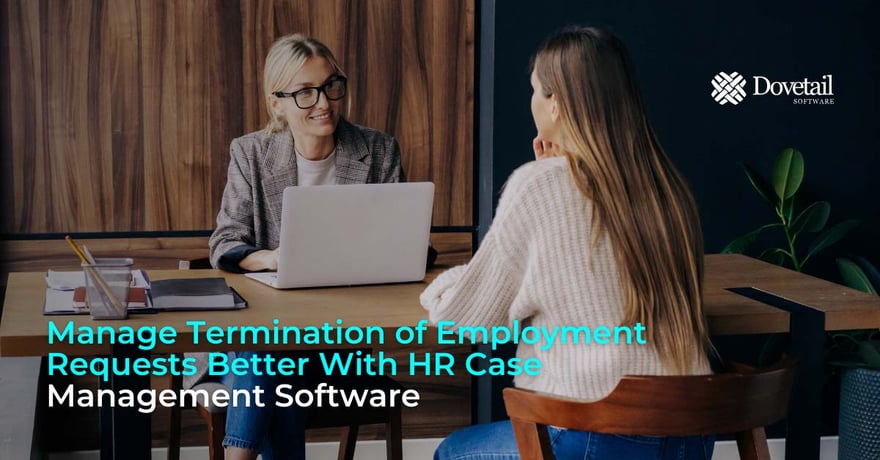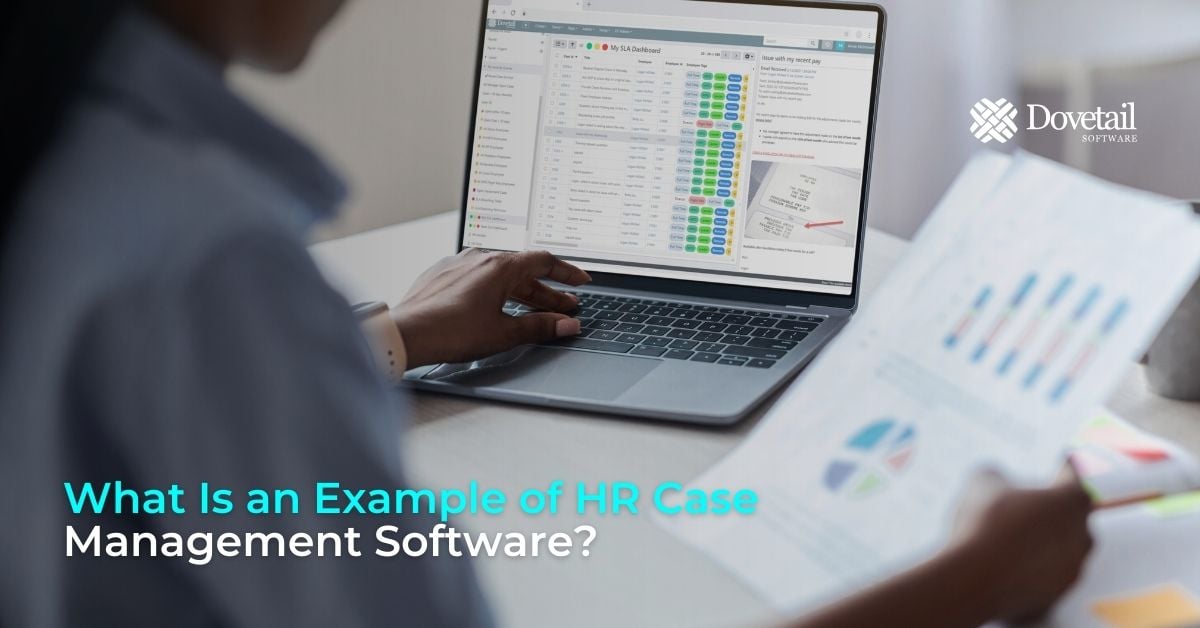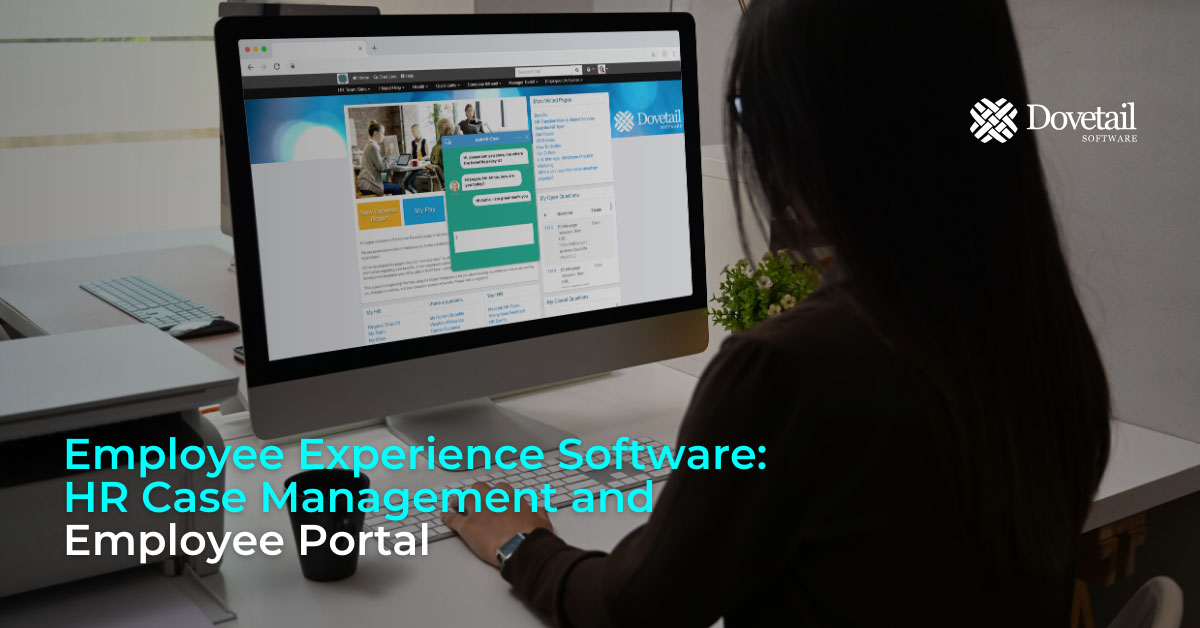
What Are Termination of Employment Requests?
How HR Case Management Systems Help
HR Case Management systems have been at the forefront of redefining how HR departments manage various requests, including termination of employment. These systems allow HR teams to:
-
Document Each Query:
- In-Depth Record Keeping: Each termination request, no matter how minor or major, is treated as a distinct case. This ensures that every bit of information related to the termination - from reasons, timelines, to supporting documentation - is preserved.
- Timestamps and Accountability: By documenting every interaction, it's easier to pinpoint when specific decisions were made, who was involved, and the reasons behind those decisions.
-
Streamline the Process:
- Consistency in Handling: Automated workflows mean that every termination request is managed consistently, following the same steps and protocols. This reduces the risk of errors or oversights.
- Task Management: HR personnel can assign, track, and manage tasks related to each case. For example, ensuring that exit interviews are scheduled, or final paychecks are processed.
-
Maintain Confidentiality:
- Role-Based Access: Not every HR personnel or manager needs to know the details of every termination. Role-based access ensures that sensitive data is only available to those directly involved.
- Encrypted Storage: Given the potential legal implications of terminations, it's crucial that data is stored securely. Modern HR Case Management systems often come with robust encryption tools to safeguard data.
-
Provide Analytics:
- Spot Patterns: By examining data over time, HR departments can identify patterns. For instance, is there a particular department or manager with a high rate of terminations?
- Continuous Improvement: Analytics can offer insights into the reasons for terminations, helping organizations address root causes such as poor training or toxic work environments.
Additional Benefits of an HR Case Management System:
-
Improved Communication: These systems can notify the necessary stakeholders at various stages of the termination process. This ensures that everyone from IT (to deactivate accounts) to finance (for final settlements) is looped in.
-
Knowledge Base Integration: Over time, the system can be populated with FAQs, best practices, and guidelines related to termination. This becomes a valuable resource for HR personnel to handle terminations more efficiently.
-
Feedback Mechanism: Post-termination, HR can gather feedback from departing employees. This feedback, when logged and analyzed, can provide crucial insights into organizational health and areas of improvement.
-
Legal Compliance: Given that terminations can be a legal minefield, having a robust system in place ensures that all necessary steps are followed, minimizing the risk of legal complications.
An HR Case Management system not only brings efficiency and order to the process of managing termination requests but also aids in risk mitigation, legal compliance, and organizational learning.
Termination of Employment Requests Are Managed Better With HR Case Management Software
If you would like to find out more about how to handle termination of employment requests in an HR Case Management system, please get in touch.
You may also like to refer to the following resource which defines the categories of termination of employment requests and lists typical questions that employees and managers ask HR.
Categories of Termination of Employment Requests: Employees
Voluntary Termination of Employment
-
Forms and Documents: Employees who are voluntarily resigning may have questions about any specific forms or documents they need to complete as part of the resignation process.
-
Protocol for Resignation Discussion: This pertains to the appropriate procedure for discussing the resignation with their immediate supervisor, ensuring a smooth transition.
-
Exit Interview Request: Employees may want to know if they can request an exit interview to provide feedback on their reasons for resigning, which can help the company gather valuable insights.
-
Confirmation of Resignation: This involves inquiries about receiving documentation confirming the resignation and its effective date, which can be important for both the employee and the employer.
-
Impact on Benefits: Questions about how the resignation will affect the employee's benefits, such as health insurance and retirement plans.
-
Company Property Return: Employees may seek information on the process for returning company property like keys, badges, or equipment.
-
Final Paycheck: Inquiries about when the final paycheck will be processed and received.
-
Non-compete or Confidentiality Agreements: Questions regarding any non-compete or confidentiality agreements that may still apply post-termination.
-
Job Placement Support: Whether there is any support available for job placement or references after leaving the company.
-
Transferring Work Responsibilities: Inquiries about procedures for transferring work responsibilities or projects to colleagues upon resignation.
-
Access to Company Systems: Questions about whether they will have access to company systems or emails after departure for any necessary post-resignation tasks.
-
Unused Sick Leave/Personal Days: Employees may want to know the company's policy regarding unused sick leave or personal days upon resignation.
-
Transition Meeting: Inquiries about scheduling a meeting to discuss the transition plan and ensure a smooth handover of responsibilities.
-
Communication of Departure: Questions regarding how their departure will be communicated to colleagues and clients, if applicable.
-
Return of Company Documents: Whether there is any information they need to provide regarding the return of company-owned documents or data.
-
Post-employment References: Inquiries about the company's policy on post-employment references and who they can refer potential employers to.
-
Impact on Stock Options: Whether the resignation will have any impact on vested stock options or equity-based compensation.
-
Legal Obligations: Questions about any legal obligations or restrictions they should be aware of during their notice period.
-
Timeline for Benefit End: Seeking clarification on the timeline for when benefits will end after the last working day.
-
Contact for Questions: Inquiries about who to contact if they have additional questions or concerns regarding their voluntary termination.
These questions cover a wide range of concerns that employees may have when voluntarily resigning, addressing various aspects of the termination process and its implications.
Typical Voluntary Termination of Employment: Questions From Employees
- Are there any specific forms or documents I need to fill out when resigning?
- What is the protocol for discussing my resignation with my immediate supervisor?
- Can I request an exit interview to provide feedback on my reasons for resigning?
- Will I receive any documentation confirming my resignation and its effective date?
- How will my resignation impact my benefits, such as health insurance and retirement plans?
- What is the process for returning company property, like keys, badges, or equipment?
- Can you provide information on the final paycheck and when I can expect to receive it?
- Are there any non-compete or confidentiality agreements I should be aware of post-termination?
- Is there any support available for job placement or references after I leave the company?
- What are the procedures for transferring work responsibilities or projects to colleagues upon resignation?
- Will I have access to company systems or emails after my departure for any necessary post-resignation tasks?
- What is the policy regarding unused sick leave or personal days upon resignation?"
- Can I schedule a meeting to discuss the transition plan and ensure a smooth handover of my responsibilities?
- How will my departure be communicated to colleagues and clients, if applicable?"
- Is there any information I need to provide regarding the return of company-owned documents or data?
- What is the company's policy on post-employment references, and who can I refer potential employers to?
- Will my resignation have any impact on vested stock options or equity-based compensation?
- Are there any legal obligations or restrictions I should be aware of during my notice period?
- Can you clarify the timeline for when my benefits will end after my last working day?
- Who should I contact if I have additional questions or concerns regarding my voluntary termination?
These questions cover various aspects of the termination process and can help employees better understand and navigate the transition.
Involuntary Termination of Employment
-
Reasons for Termination: Employees facing involuntary termination may want to know why they were selected for termination.
-
Appeal Process: Questions about whether there is an appeals process available for contesting the termination decision.
-
Severance Package: Inquiries regarding the severance package they may be entitled to upon involuntary termination.
-
Discussion of Termination: Employees may seek information on the specific process for discussing the reasons behind their termination.
-
Decision-Making Process: Questions about who was involved in the decision-making process for their termination.
-
Timeline and Logistics: Seeking details about the timeline and logistics of their departure.
-
Next Steps: Inquiries about what steps to take after the termination.
-
Impact on Benefits: Questions regarding how the termination will impact their benefits, such as health insurance and retirement plans.
-
Non-compete or Confidentiality Agreements: Whether there are any non-compete or confidentiality agreements that still apply post-termination.
-
Access to Company Systems: Whether they will have access to company systems or emails after departure for any necessary post-termination tasks.
-
Return of Company Property: Questions about how to return company property like keys, badges, or equipment.
-
Exit Interview: Inquiries about whether there will be a formal exit interview or discussion to provide feedback on their termination.
-
Timeline for Benefit End: Seeking clarification on the timeline for when benefits will end after the last working day.
-
Return of Work-related Documents: Questions about the process for returning work-related documents or data.
-
Legal Obligations: Inquiries about any legal obligations or restrictions they should be aware of during their notice period.
-
Communication of Departure: How their departure will be communicated to colleagues and clients, if applicable.
-
Final Paycheck: Seeking information on the final paycheck and when it will be received.
-
Request for Reference: Whether they can request a reference or recommendation for future employment opportunities.
-
Impact on Stock Options: Whether the termination will have any impact on vested stock options or equity-based compensation.
-
Contact for Questions: Inquiries about who to contact if they have additional questions or concerns regarding their involuntary termination.
These questions cover various aspects of the involuntary termination process and can help employees gain clarity and navigate the situation.
Typical Involuntary Termination of Employment: Questions From Employees
- Why was I selected for termination?
- Can I appeal this decision?
- What severance package am I entitled to?
- Is there a specific process for discussing the reasons behind my termination?
- Who was involved in the decision-making process for my termination?
- Can you provide details about the timeline and logistics of my departure?
- What are the next steps for me after the termination?
- How will my termination impact my benefits, such as health insurance and retirement plans?
- Are there any non-compete or confidentiality agreements that still apply post-termination?
- Will I have access to company systems or emails after my departure for any necessary post-termination tasks?
- How should I return company property, like keys, badges, or equipment?
- Will there be a formal exit interview or discussion to provide feedback on my termination?
- Can you clarify the timeline for when my benefits will end after my last working day?
- What is the process for returning work-related documents or data?
- Are there any legal obligations or restrictions I should be aware of during my notice period?
- How will my departure be communicated to colleagues and clients, if applicable?
- Can you provide information on the final paycheck and when I can expect to receive it?
- Can I request a reference or recommendation for future employment opportunities?
- Will my termination have any impact on vested stock options or equity-based compensation?
- Who should I contact if I have additional questions or concerns regarding my involuntary termination?
These questions cover various aspects of the involuntary termination process and can help employees gain clarity and navigate the situation.
General Termination of Employment: Questions From Employees
-
Impact on Retirement Benefits: Questions about how the termination will affect retirement benefits.
-
Continuation of Health Insurance: Whether they can continue to use the company's health insurance.
-
Employment Reference: What will be mentioned in their employment reference.
-
Confirmation of Termination: Seeking confirmation and documentation of the termination and its effective date.
-
Return of Company Property: Inquiries about the process for returning company property like keys, badges, or equipment.
-
Protocol for Termination Discussion: Questions about the protocol for discussing the termination with their immediate supervisor.
-
Impact on Vacation Days: How the termination will impact any accrued or unused vacation days.
-
Exit Interview Request: Whether they can request an exit interview to provide feedback or discuss the reasons for their termination.
-
Non-compete or Confidentiality Agreements: Whether there are any non-compete or confidentiality agreements that still apply post-termination.
-
Timeline and Logistics: Seeking details about the timeline and logistics of their departure.
-
Unused Sick Leave/Personal Days: Inquiries about the company's policy regarding unused sick leave or personal days upon termination.
-
Transition Plan: Whether there will be a formal transition plan to ensure a smooth handover of responsibilities.
-
Legal Obligations: Questions about any legal obligations or restrictions they should be aware of during their notice period.
-
Timeline for Benefit End: Seeking clarification on the timeline for when benefits will end after the last working day.
-
Return of Work-related Documents: How to return any work-related documents or data.
-
Impact on Stock Options: Whether the termination will have any impact on vested stock options or equity-based compensation.
-
Transition Meeting: Inquiries about scheduling a meeting to discuss the transition plan.
-
Communication of Termination: How the termination will be communicated to colleagues and clients, if applicable.
-
Possibility of Rehire: Whether there will be an opportunity to discuss the possibility of rehire in the future.
-
Contact for Questions: Inquiries about who to contact if they have additional questions or concerns regarding their termination or the transition process.
These questions address various aspects of termination and can help employees get the information they need during this period of change.
General Termination of Employment: Questions From Employees
- How will this affect my retirement benefits?
- Can I continue to use the company's health insurance?
- What will be mentioned in my employment reference?
- Will I receive any documentation confirming my termination and its effective date?
- Is there a specific process for returning company property, like keys, badges, or equipment?
- What is the protocol for discussing my termination with my immediate supervisor?
- How will my termination impact any accrued or unused vacation days?
- Can I request an exit interview to provide feedback or discuss the reasons for my termination?
- Are there any non-compete or confidentiality agreements that still apply post-termination?
- Can you provide details about the timeline and logistics of my departure?
- What is the company's policy regarding unused sick leave or personal days upon termination?
- Will there be a formal transition plan to ensure a smooth handover of my responsibilities?
- Are there any legal obligations or restrictions I should be aware of during my notice period?
- Can you clarify the timeline for when my benefits will end after my last working day?
- How should I return any work-related documents or data?
- Will there be any impact on my stock options or equity-based compensation?
- Can I schedule a meeting to discuss the transition plan and ensure a smooth departure?
- How should I communicate my termination to colleagues and clients, if applicable?
- Will there be an opportunity to discuss the possibility of rehire in the future?
- Who should I contact if I have additional questions or concerns regarding my termination or the transition process?
These questions cover various aspects of termination and can help employees get the information they need during this period of change.
Categories of Termination of Employment Requests: Managers
Initiation of Termination of Employment
-
Initiating Termination Request: Managers may have questions about how to initiate a termination request for an underperforming employee. This involves understanding the steps and procedures to start the termination process.
-
Documentation Requirements: Managers might inquire about the documentation required to support their decision to terminate an employee. Proper documentation is essential for legal and HR compliance.
-
Legal Implications: Managers may seek information about any legal implications associated with terminating an employee, ensuring that they are aware of legal requirements and potential risks.
-
Initiating Termination Process: Questions may arise about the proper channels or forms to use when initiating the termination process, ensuring that the process is initiated correctly.
-
Timeline for Termination: Managers might want to know the timeline for the termination process, from initiation to completion, to plan accordingly.
-
Termination Discussion: Inquiries may relate to specific steps or procedures to follow when discussing the termination with the employee, including maintaining professionalism and sensitivity.
-
Impact on Employee Benefits: Questions about how the termination will affect the employee's benefits, such as health insurance and retirement plans.
-
Severance Package: Managers may seek clarification on the severance package or exit compensation that may be applicable in the case of termination.
-
HR Support for Transition: Managers may want to know what resources or support HR can provide to facilitate a smooth transition for the departing employee, ensuring the process is as stress-free as possible.
-
Confidentiality Considerations: Inquiries may touch upon considerations or implications related to workplace confidentiality during the termination process.
-
Termination Letter Assistance: Managers might ask whether HR can assist in drafting the termination letter or communication to the employee, ensuring proper documentation.
-
Return of Company Property: Questions may relate to the company's policy regarding the return of company property, such as keys, badges, or equipment, from the departing employee.
-
Communication to Team: Managers might inquire about how to effectively communicate the termination to the team or colleagues of the departing employee.
-
Non-compete and Non-disclosure Agreements: Inquiries may cover whether there are any non-compete or non-disclosure agreements that apply to the situation.
-
Handling Legal Challenges: Managers may want to know if HR can provide guidance on handling potential legal challenges or disputes that may arise from the termination.
-
Employee's Access to Company Systems: Questions may relate to the protocol for managing the employee's access to company systems or emails post-termination.
-
References for Departing Employee: Managers might seek guidance on how HR can handle requests for references for the departing employee.
-
Impact on Team and Transition Planning: Inquiries may touch upon HR's insights into the impact of the termination on the team and suggestions for transition planning.
-
Accrued Vacation Days: Managers may want to know if there are any considerations related to the departing employee's accrued or unused vacation days.
-
Contact for Questions: Questions about who to contact in HR if they have additional questions or concerns during the termination process.
These questions from managers to HR cover various aspects of initiating and managing the termination process for an underperforming employee, ensuring a smooth and legally compliant termination process.
Initiation of Termination of Employment: Questions From Managers
- How do I initiate a termination request for an underperforming employee?
- What documentation is required to support this decision?
- Are there any legal implications I should be aware of?
- Can you provide guidance on the proper channels or forms to initiate the termination process?
- What is the timeline for the termination process, from initiation to completion?
- Are there any specific steps or procedures I should follow when discussing the termination with the employee?
- How will the termination affect the employee's benefits, such as health insurance and retirement plans?
- Can you explain the severance package or exit compensation that may be applicable in this case?
- What resources or support can HR provide to facilitate a smooth transition for the departing employee?
- Are there any considerations or implications related to workplace confidentiality during this process?
- Can HR assist in drafting the termination letter or communication to the employee?
- What is the company's policy regarding the return of company property, keys, badges, or equipment from the departing employee?
- Can HR advise on how to communicate the termination to the team or colleagues of the departing employee?
- Are there any non-compete or non-disclosure agreements that apply to this situation?
- Can HR provide guidance on handling any potential legal challenges or disputes that may arise from the termination?
- What is the protocol for managing the employee's access to company systems or emails post-termination?
- How should HR handle requests for references for the departing employee?
- Can HR provide insight into the impact of the termination on the team and offer suggestions for transition planning?
- Are there any considerations related to the employee's accrued or unused vacation days?
- Who should I contact in HR if I have additional questions or concerns during the termination process?
These questions from the manager to HR cover various aspects of initiating and managing the termination process for an underperforming employee and can help ensure a smooth and legally compliant termination process.
Handling the Termination of Employment Process
-
Termination Communication: Managers may inquire about how to effectively communicate the termination to the employee, ensuring professionalism and empathy.
-
Smooth Transition: Questions may relate to the steps to take to ensure a smooth transition, including knowledge transfer and task reallocation.
-
Knowledge Transfer: Managers might want to know how to manage the knowledge transfer process to ensure a seamless transition for the team.
-
Termination Meeting Best Practices: Inquiries may touch upon best practices for conducting the termination meeting with the employee, maintaining respect and dignity.
-
Communication Templates: Managers may ask if there are specific documents or templates available for communicating the termination effectively, ensuring clarity.
-
Termination Letter Contents: Questions may relate to what should be included in the termination letter or communication to the employee, meeting legal requirements.
-
Scheduling Termination Meeting: Managers might inquire about HR's assistance in scheduling and coordinating the termination meeting.
-
Support for Departing Employee: Questions may pertain to resources or support services available to help the departing employee during their transition period, including emotional support.
-
Emotional and Psychological Aspects: Managers may seek suggestions on addressing the emotional and psychological aspects of the termination for the departing employee.
-
Managing Reactions: Inquiries may touch upon how to manage the reactions and emotions of the departing employee, maintaining a supportive environment.
-
Timeline for Departure: Managers might want to know the timeline for the employee's departure and the transition plan, ensuring proper planning.
-
Transfer of Responsibilities: Questions may relate to how to transfer the departing employee's responsibilities to other team members or colleagues efficiently.
-
Critical Tasks and Projects: Inquiries may cover whether there are any critical tasks or projects that need immediate attention during the transition period.
-
Confidentiality Maintenance: Managers may inquire about maintaining confidentiality throughout the termination process, especially with sensitive information.
-
Return of Company Property: Questions may relate to how to handle the return of company property, such as keys, badges, or equipment, from the departing employee.
-
Communication to Team: Managers might seek suggestions for communicating the termination to the remaining team members or colleagues, maintaining transparency.
-
Smooth Knowledge Handover: Inquiries may touch upon ensuring a smooth handover of the departing employee's knowledge and work-related information.
-
Data Access and Security: Managers may want to know about considerations regarding data access and security during the transition.
-
Access to Company Systems: Questions may relate to HR's guidance on managing the departing employee's access to company systems or emails post-termination.
-
Contact for Support: Inquiries about who to contact in HR if they have additional questions or need support during the termination process.
These questions address various aspects of managing the termination process effectively, professionally, and with sensitivity to the departing employee's needs.
Handling the Termination of Employment Process: Questions From Managers
- How do I communicate the termination to the employee?
- What steps should I take to ensure a smooth transition?
- How do we manage the knowledge transfer?
- Can you provide guidance on the best practices for conducting the termination meeting with the employee?
- Are there any specific documents or templates available for communicating the termination effectively?
- What should be included in the termination letter or communication to the employee?
- Can HR assist in scheduling and coordinating the termination meeting?
- Are there any resources or support services available to help the employee during their transition period?
- How can we address the emotional and psychological aspects of the termination for the employee?
- Can you provide suggestions on how to manage the reactions and emotions of the departing employee?
- What is the timeline for the employee's departure and transition plan?
- Can HR offer guidance on how to transfer the departing employee's responsibilities to other team members or colleagues?
- Are there any critical tasks or projects that need immediate attention during the transition period?
- Can HR provide recommendations on how to maintain confidentiality throughout the termination process?
- How should we handle the return of company property, keys, badges, or equipment from the departing employee?
- Can HR offer suggestions for communicating the termination to the remaining team members or colleagues?
- What should be done to ensure a smooth handover of the departing employee's knowledge and work-related information?
- Are there any considerations regarding data access and security during the transition?
- Can you provide guidance on managing the departing employee's access to company systems or emails post-termination?
- Who should I contact in HR if I have additional questions or need support during the termination process?
Post-Termination of Employment
-
Addressing the Team: Managers may inquire about how to address the team after an employee's termination, maintaining team morale.
-
Support for Team Members: Questions may pertain to the support HR can provide to the remaining team members, especially those affected emotionally by the termination.
-
Handling External Communications: Managers might want guidance on how to handle external communications or inquiries about the termination, maintaining professionalism.
-
Team Meeting Timing and Format: Inquiries may touch upon HR's guidance on the timing and format of a team meeting or communication addressing the termination.
-
Key Messages: Managers may seek advice on key messages or talking points
Post-Termination of Employment: Questions From Managers
- How do I address the team after an employee's termination?
- What support can HR provide to the remaining team members?
- How do we handle external communications or inquiries about the termination?
- Can HR offer guidance on the timing and format of a team meeting or communication addressing the termination?
- Are there any key messages or talking points that should be communicated to the team regarding the termination?
- Can HR provide resources or support for team members who may be affected emotionally by the termination?
- What steps can be taken to help the team adjust to the changes resulting from the termination?
- Are there any expectations or guidelines for team members in terms of discussing the termination with external parties?
- How should we handle questions or inquiries from clients, customers, or external stakeholders regarding the departed employee?
- Can HR assist in drafting or reviewing external communications related to the termination?
- Are there any legal or privacy considerations when discussing the termination with external parties?
- Can you provide guidance on maintaining professionalism and confidentiality in external communications?
- What should be done to ensure a smooth transition of the departed employee's responsibilities to the team?
- Can HR assist in reallocating work or projects among the remaining team members to maintain productivity?
- Are there any additional resources or training opportunities for team members to help them handle their increased workload?
- Can HR provide suggestions for maintaining team morale and motivation during the transition period?
- How can we ensure that the team is aware of any changes in reporting lines or roles resulting from the termination?
- What is the process for updating internal records and systems to reflect the changes in the team structure?
- Can HR offer guidance on documenting the transition and any changes in responsibilities?
- Who should I contact in HR if I have additional questions or need support in the post-termination phase?





























